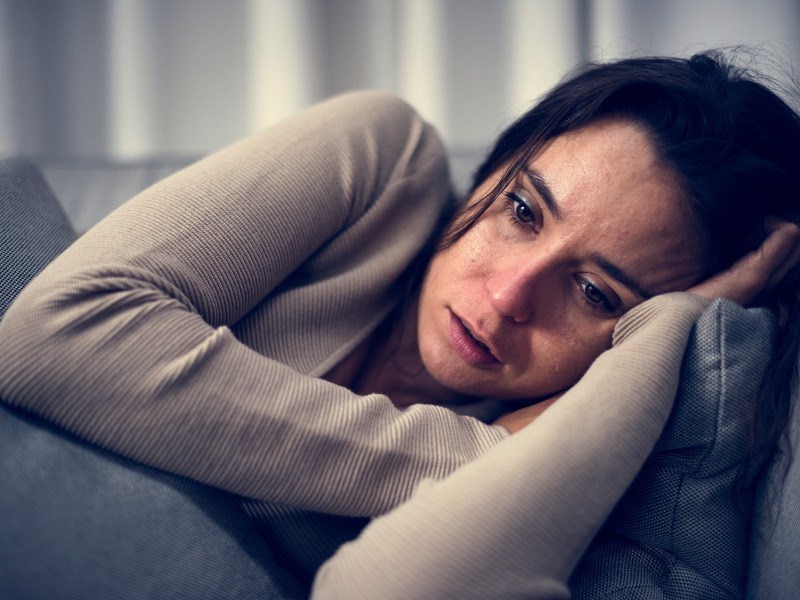Depression, Our Common Experience

Depression is an affective disorder (mood) lasting at least 2 weeks, but no longer than 2 years (1 year in children and adolescents). Symptoms last continuously or for most of the time. Depressive episodes may be mild, moderate or severe, depending on the number and severity of symptoms.
When depression comes, it is like pressing a contact – everything suddenly goes out, the world loses its colour, the future turns into an impenetrable black wall and the past into a series of dark events burdening the patient with guilt.
Normal life energy disappears, every decision becomes incredibly difficult, the slightest things grow into problems that cannot be solved. In front of the sick there are difficulties piling up like heavenly mountains.
Depression, contrary to appearances, is our common experience. There is probably no one who could not survive this state alone, when everything around us – the whole world, but also we ourselves appear as if through dark glasses.
But when deep sadness and depression last too long, we are dealing with depression.
Depression, or as melancholy, is always a source of great suffering. People who experience it think that they are under the influence of some terrifying charm, that some whirl of darkness draws them in and some bottomless pit sucks in their energy, their hope, their joy.
Overcoming Depression that it is a devastating disease that affects millions of people every year, causing not only emotional pain that complicates everyday, family and professional life, but also increases susceptibility to other diseases and sometimes ends in suicidal death
Symptoms of depression
- affective symptoms (e.g. depression, sadness, reduced mood, feeling of emptiness, irritability, loss of interest in the surrounding world, discouragement)
- cognitive symptoms (e.g. negative perception of oneself and the outside world, lack of hope for recovery, incompetence, self-criticism, guilt, low self-esteem, problems with thinking, concentration, memory and decision making, suicidal tendencies)
- behavioural symptoms (e.g. withdrawal from social activity, staying in bed for a longer period of time [in a severe course], avoiding social interaction, slowing down or agitation, anxiety)
- somatic symptoms (e.g. reduced energy level, lack of appetite [5% of weight loss in a month] or excessive appetite, sense of heaviness, difficulty in falling asleep, early awakening, unsatisfied or excessive sleep).
If you notice similar symptoms in yourself, you should seek the help of specialists: a psychologist or psychotherapist, a psychiatrist or a family doctor.
Different facets of depression
Psychological depression (an emotional response to loss and disappointment), biological depression (in many ways a body disease) and mixed depression (combining emotional and somatic symptoms.
The psychological symptoms of depression include: sadness and despair, irritability, low self-esteem, apathy and lack of motivation, difficulties in interpersonal relations, guilt, negative thinking and suicidal thoughts.

He claims that psychological depression can be defined in two ways: in the first, the basis is a psychological or emotional reaction to specific events; in the second, it causes only psychological (emotional) symptoms without changing the biological functions of the organism.
As far as biological depression is concerned, he believes that it is the result of biological changes in the body rather than a reaction to changes or painful experiences in life. Among the biological (somatic) symptoms of depression he mentions, among others, sleep disorders, anorexia, loss of sexual drive, fatigue and lack of life energy, inability to feel joy/pleasure (anhedonia).
Defining mixed depression (psychological depression with biological symptoms) he claims that symptoms of this kind appear in connection with psychological reaction to some events, and that besides emotional symptoms there are also physiological ones.
For example, he considers mixed depression to be a symptom of attention deficit and short-term memory disorder, hypochondria, abuse of psychotropic agents or alcohol, emotional hypersensitivity (anger, irritability), marked mood swings and anxiety.
Brain function during depression
Some structures of the human brain play an important role in the process of controlling emotions and various biological cycles. For depression, the hypothalamus and limbic system are the most important.
The hypothalamus is an extremely complex part of the brain. It controls, among other things, the hormonal and immune systems, the sleep cycle, appetite, sexual drive and the ability to feel pleasure.
The limbic system, whose various elements are located around the hypothalamus, is sometimes called the emotional brain because it is the source of our feelings.
If the hypothalamus and limbic system function properly, we can fall asleep and sleep well, we can rest, we have a normal appetite and sexual desire, we feel normal, we have a lot of strength and pleasure when something nice happens to us. When the axis of the hypothalamus/libic system is affected by interference, depression occurs.
Causes of depression
The causes of depression can be found in factors that increase susceptibility to this disease: The causes of depression can be traced back to factors that increase the susceptibility to the disease.
These include, for example, neglect, loss in childhood, parents emotionally inaccessible, excessively harsh family home atmosphere, lack of encouragement to mature, sexual abuse), hereditary factors, as well as current or recent factors: loss of a loved one, existential losses (disappointment and loss of dreams, awareness of own mortality).
Events that undermine self-respect, somatic disease and chronic pain, long-term stress, and in biological factors such as adverse drug reactions, abuse of alcohol and psychotropic substances, somatic disease, stress, endogenous depression.
Am I depressed?
Depression (occurrence and severity of depression) can be measured and diagnosed with the help of various research tools. One of the most frequently used psychological tests to assess the presence and severity of depression symptoms.
Nevertheless, it often happens that people who do not want to use the help of specialists (psychiatrist, family doctor, psychologist or psychotherapist) try to cope on their own and diagnose emerging problems on their own.


 SEO for E-Commerce Platforms
SEO for E-Commerce Platforms  Air Conditioning Repairs You Should Know About
Air Conditioning Repairs You Should Know About  Sea Moss into Your Daily Meals
Sea Moss into Your Daily Meals  Data Storage for Personalized Medicine
Data Storage for Personalized Medicine  Tips for Maintaining Your Plumbing System
Tips for Maintaining Your Plumbing System  CBD in Managing Arthritis Symptoms
CBD in Managing Arthritis Symptoms